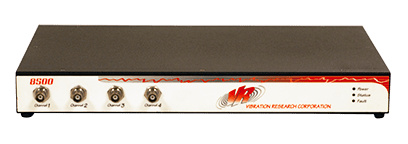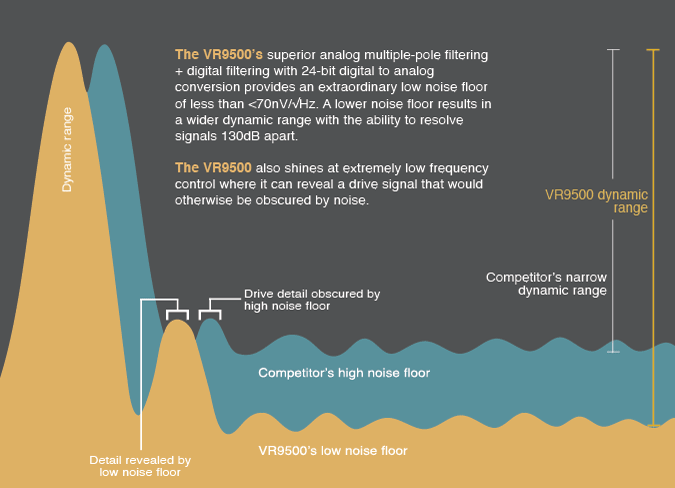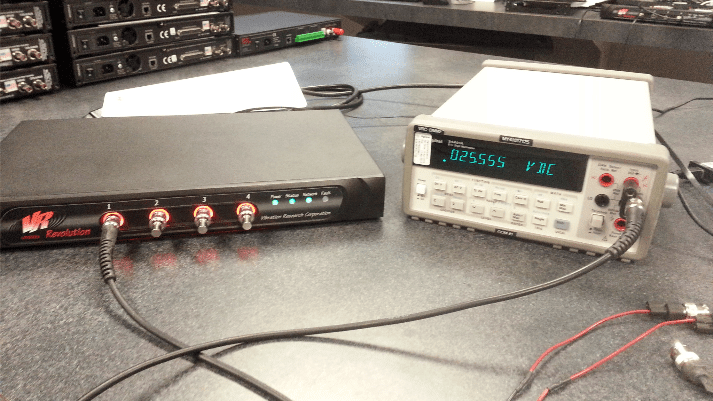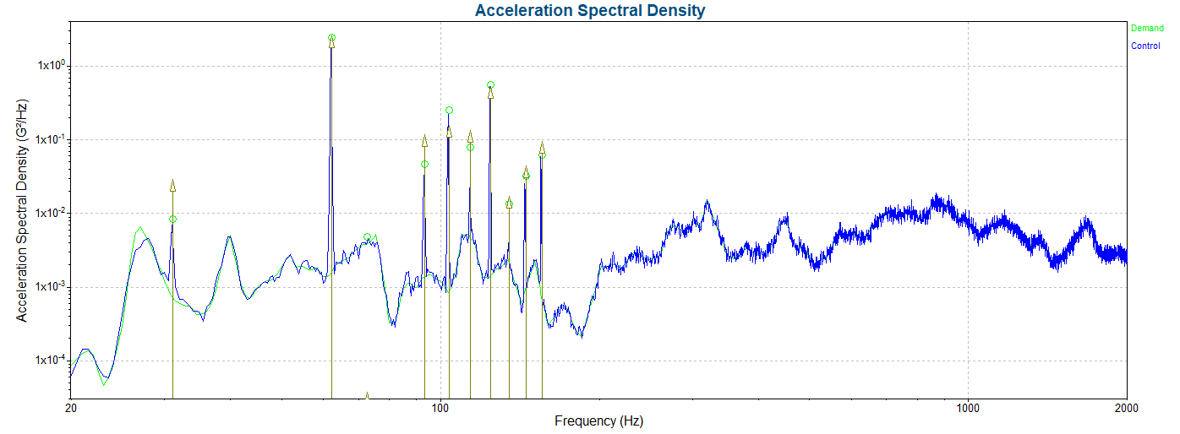Vibration Research introduced the VR9500 vibration controller as the next revolution in vibration control hardware. It is an industry-leading system that builds upon the capabilities of its predecessor—the VR8500.

VR8500 controller.
Compared to the VR8500, the VR9500 offers better control, greater efficiency, and more testing abilities. Additionally, the VR8500 does not support any software version past 2016. If you are using a VR8500 and are interested in expanding your testing capabilities, the VR9500 is a significant upgrade.
VR also offers the VR10500: a higher channel count system comparable to the VR9500. The VR10500 was designed to coordinate with high-channel-count and multi-shaker systems.
Why Upgrade?
| VR8500 | VR9500 | VR10500 | |
| Hardware Warranty |
No |
Lifetime |
Lifetime |
| Processor |
RISC Processor |
Dual High-Speed RISC Processor |
Dual High-Speed RISC Processor |
| Lines of resolution |
13,000 |
26,000 |
104,000 |
| Max control frequency for Sine |
0.1 to 20,000Hz |
0.1 to 50,000Hz |
0.1 to 50,000Hz |
| Max control frequency for Random |
0.5 to 20,000Hz |
0.5 to 50,000Hz |
0.5 to 50,000Hz |
| Sample frequency |
Up to 52,000Hz |
Up to 200,000Hz |
Up to 256,000Hz |
| Narrow spectral bands with Random-on-Random |
Up to 12 |
Up to 32 |
Up to 32 |
| True floating-point sine tones with Sine-on-Random |
Up to 12 |
Up to 32 |
Up to 32 |
| Sine includes COLA and notching |
No |
Yes |
Yes |
| Random includes notching |
No |
Yes |
Yes |
| Dynamic range |
>120dB |
>130dB |
>130dB |
| Light indicators on hardware show sensor connection |
No |
Yes |
Yes |
| Self calibration |
No |
Yes |
Yes |
| Ethernet connection speed |
100Kps |
1,000Kps (Gigabit) |
1,000Kps (Gigabit) |
| Noise floor |
Not applicable |
<70nV/sqrt(Hz) |
<70nV/sqrt(Hz) |
| Clock synchronization |
No |
Yes |
Yes |
| Multi-axis testing ability |
Yes |
Yes |
Yes |
Control
The VR9500/VR10500 offers the ability to achieve the frequency resolution required for your test. The VibrationVIEW software supports 104,000 lines of resolution (26,000 with the VR9500), which is much greater than the VR8500’s 13,000 maximum lines. Higher lines of resolution are advantageous for low-frequency control, as the control roll-off is much sharper. They also excite resonances more accurately.
You can extend the frequency range for Sine and Random to 50,000Hz with the VR9203 High-Frequency option without sacrificing resolution (up to 20,000Hz for the VR8500).
The VR9500/VR10500’s sample frequency also reaches up to 200,000Hz, compared to 52,000Hz for the VR8500. A higher sample rate acquires more data in the same timeframe and forms a better representation of the input signal.
Noise Floor and Dynamic Range
Background noise from digital circuits contributes to a controller’s noise floor. The noise floor can conceal important resonances if its acceleration levels are close to the resonance. The VR9500/VR10500 has a low noise floor of <70nV/sqrt{Hz}. The VR8500 does not take the noise floor into account.
Noise floor also helps to make up a controller’s dynamic range. This value represents the range of voltage that you can properly control during a test. Test equipment such as vibration controllers can never have too high of a dynamic range. The dynamic range of VR controllers was increased from >120dB with the VR8500 to >130dB with the VR9500/VR10500.

Efficiency
The VR9500/VR10500 has a dual high-speed RISC processor and an internet connection speed of 1,000Kps (Gigabit) compared to the VR8500’s 100Kps. It also includes features that improve the efficiency of a test setup and vibration control, including lights on the hardware to indicate sensor connection and clock synchronization.
Self-Calibration

The VR9500/VR10500 can also perform self-calibration. Calibration ensures that your measurements are accurate within the specification limits. It should be performed once a year for proper maintenance.
While the VR team is glad to evaluate your controller yearly, you can also perform calibration in-house with the VibrationVIEW software. The Automated Calibration Verification software automates the verification process to avoid downtime in the lab. Conversely, the VR8500 must be mailed to VR each year for calibration. View the VR calibration options.
Capability
Compared to the VR8500, the VR9500/VR10500 provides more options for mixed-mode testing, notching, multi-axis testing.
Mixed-Mode
Mixed-mode vibration testing simulates complex field environments, where the vibration environment is not purely random or sinusoidal but a combination of vibration modes.
A random-on-random test profile includes random background and narrow-band signals. The narrow-band signals can be swept or fixed frequency and are superimposed on the base random energy profile. With the VR9500/VR10500, you can define up to 32 narrow spectral bands to superimpose (the VR8500 supports up to 12).
Similarly, a sine-on-random test profile includes sinusoidal vibration superimposed on a random background. The VR9500/VR10500 also supports up to 32 floating-point precision sine tones.

Sine-on-random test profile.
Notching
The Sine and Random test modes include a notching option not supported by the VR8500. This feature allows you to notch a response channel to a user-defined value or abort the test above a maximum level. Notching helps protect your product by monitoring acceleration levels and limiting the drive signal where large resonances are present.
Multi-Axis
The VR9500/VR10500 supports more multi-shaker configurations than the VR8500, including dual-axis and triaxial control.
Make the Switch

Vibration Research offers a lifetime hardware warranty on the VR9500/VR10500 with a continuous U&SA agreement. The first three years of the agreement are included with your purchase.
If you are interested in trading in your VR8500 controller for a VR9500/VR10500, please contact your sales representative to get started.
